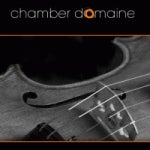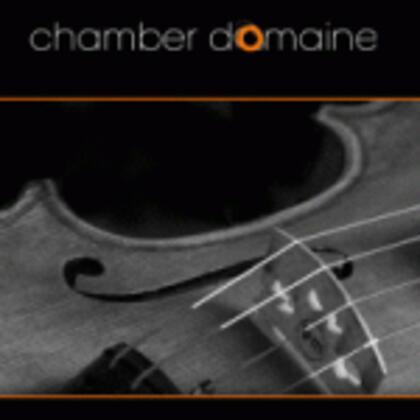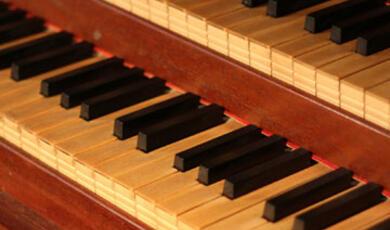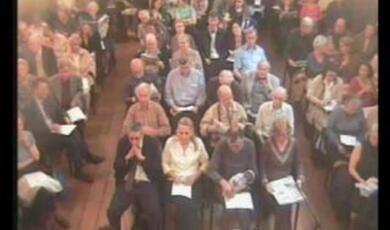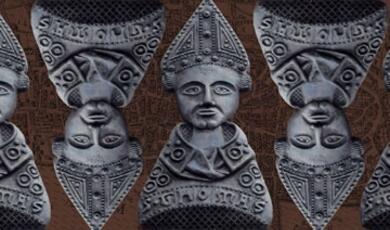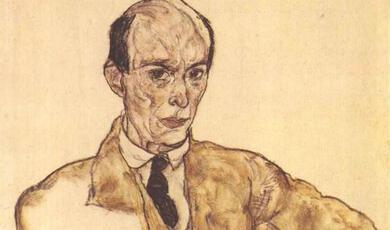Haydn in London: The Revolutionary Drawing Room
Share
- Details
- Transcript
- Audio
- Downloads
- Extra Reading
This concert looks at 18th century music making and the demand for chamber music to be performed in the home. The talk will look at the Tavern Concert and will consider the evolving musical language and the dialogue between composer and audience through the music. Haydn and Mozart will be performed alongside rarely heard works by Field, Onslow, Viotti and Dussek.
2009 marks the 200th anniversary of Haydn's death and this event is part of the series of concerts that puts his fantastic instrumental chamber music and song into its social and cultural context. Each concert will be proceeded by a talk by Thomas Kemp, the artistic director of Chamber Domaine, recently praised in The Guardianfor its "dynamic commitment and high virtuosity. A breath of fresh air."
The pieces performed were:
George Onslow - Allegro con Spirito for Piano Trio (Dedicated to Dussek)
Giovanni Battista Viotti - Andante Sostenuto from Concerto No 28 for Violin and Piano
Ludwig van Beethoven - English Folk Songs for Tenor and Piano Trio
Sally in our Alley
Sunset
Again my Lyre
John Field - Nocturne No 4 in A Major
Joseph Haydn - Scottish Folk Songs for Tenor and Piano Trio
The Berks of Abergeldie
O, Let me in
The White Cockade
Wolfgang Amadeus Mozart - Piano Quartet in G K478
Allegro
Andante
Rondo - Allegro Moderato
The other concerts in the series Haydn in London include:
The Enlightenment and Revolution
London: The place to be seen and heard
Papa Haydn or Genial Revolutionary?
Download Transcript
HAYDN IN LONDON:
THE REVOLUTIONARY DRAWING ROOM
Thomas Kemp
Today's concert reflects the kind of music that people would have played in their homes in the 1790s and 1800s. In order to understand something about musical life in London during this period, we need to look back to the early 18th Century and the 17th Century to see how musical life had evolved.
During the Renaissance, music became a very important part of court life. Even in the British court, Henry VIII's court for example, there was much music making, and you had composers such as Tallis writing music for the Chapel Royal. Most of the professional musicians, as we would now refer to them, of that time were brought up in the cathedral tradition, which still goes on to this day across the country. They would have started out as choristers, and there was a general assumption that if your son went into a choir, he would sing as a man in that choir, and if he played an instrument, he would probably become a professional musician. So in a way, it was a kind of ecclesiastical apprenticeship into the music profession.
For instrumentalists during this period, it was a different kind of ballgame. Music was played in the home, but the idea of public concerts did not really emerge until the end of the 1600s. We actually find that the first public concert hall in Britain was just off the Strand, in York Buildings, which was built in 1680. That was the first concert hall that was open to the general public. Before then, if people wanted to go and hear a concert, they would only hear it if the king invited them, or if a particular noble in an aristocratic family had an interest in music, they might have a little concert in their house, but the idea of everyday people coming along and listening to a concert did not really exist until 1680 onwards.
Then we see a large explosion of music-making and concerts from 1680 onwards, but where did these people train? One of the clues in today's concerts is a marvellous piece by John Field. It is a nocturne. John Field was an Irishman, who was an incredibly talented musician as a young boy, and his father paid for John Field to be an apprentice to Clementi, who was an Italian composer living in London. Clementi, like many musicians of this time, was very entrepreneurial. Not only did he write music, he performed his own music; he also owned a piano shop, and he had a company that made pianos. So there was a whole lot of things going on there with Clementi, and Field came to learn from him as his assistant. Consequently, after a long apprenticeship, Field became a virtuoso pianist, but this was something that probably extends right back into the medieval idea of apprenticeships and guilds. So there was nothing particularly special about this musical form or apprenticeship as this was the same as studying any other type of trade. John Field is a key example of that, and his father would have had to have given Clementi a sum of money in order to feed him and train him the trade of playing the piano and writing music, and obviously, Field would have had to have copied Clementi's music and would have had to have helped Clementi as a sort of servant-type figure.
Field went on to become one of the great virtuoso pianists of the early 19th Century. As you will hear from this nocturne today, his music bridges the gap between the sonatas of Beethoven and Chopin. Both Chopin and Liszt revered Field's music because they saw him as one of the key figures in the early Romantic movement, which led to the cult of the virtuoso performer, and Field was one of those figures.
When he was a little bit older, after he had finished his apprenticeship, he travelled very widely performing. He actually ended up in St Petersburg, working there, and what is so interesting about many of the musicians of this period is that it is a very international scene. Many of the musicians that were working in London were from Italy or from France. Dussek, who was Czech, and also Viotti, who was Italian, both ended up in London in 1789, because they worked for Marie Antoinette's court, so they had to leave, and they came here and made money giving concerts in London. Dussek was a great concert pianist and Viotti was a great violinist. Viotti was actually thrown out of Britain in 1798 for being a Jacobite. Whether that is true or not, I do not know, but he gave up the violin and became a wine merchant, so there must be some kind of moral in that story! But having said that, Viotti was a great figure in France because he effectively established the French school of violin playing.
What we do not have in this period is a system of conservatories and a professional training for musicians. What we have is a kind of apprenticeship system, which goes very far back, right back into the Middle Ages. In London, the first professional place to study music was the Royal Academy of Music in 1822. Reading back through some literature, Gresham College in fact, in 1597, was the first place in London to have a Professor of Music, which was a position first held by John Bull. Having said that, looking through the list of Professors after that, very few of them, until the 19th Century, were actually musicians, and this was because the training in the Inns of Court, which were effectively the third university in Britain - you had Oxford and Cambridge during this period, and the Inns of Court, and obviously Gresham College, which was around long before London University was thought of - and as part of this sort of humanist training for the legal profession, they were expected to know about music and the arts and to be generally well-rounded. So this is quite an interesting thing, so maybe many of the musicians that played music in this part of town, possibly in their own homes or elsewhere, or went to concerts, were people that had been brought up with music through that kind of background, rather than some kind of academic training or through some kind of vocational training.
What we see in the 19th Century is an emergence, largely fuelled on this incredible growth in concert-giving, of professionalisation in music and a much bigger input from institutions. This resulted in many more people gaining access to music in concerts and also through mass publishing. This meant that people were able to pick up the latest Haydn quartet, or the latest Mozart piano quartet, or the latest Dussek volume of piano trios, so that they could play them in their own homes.
One of the pieces on today's programme is by a composer called Onslow. He is an interesting figure because his father was the Duke of Onslow, who was kicked out of Britain for having a homosexual affair. Onslow was very wealthy, he did not have to earn a living as a musician, but, nevertheless, his music enjoyed a lot of popularity in the early-1800s. He was a pupil of Dussek and obviously was a good pianist, but this particular movement that we are playing today is typical of the type of music that would be easily playable by an amateur musician in their own home. You will notice that the part writing is not particularly complicated. It is quite lively and entertaining music, but there are no great harmonic developments or there is no feeling that he is trying to break the boundaries of how music is perceived during this period.
The Mozart G Minor Piano Quartet, which was written in 1785 is one of the first piano quartets ever written. What is interesting about this piece is that there is a real interplay between the instruments. You will hear the tunes equally passing between all the instruments. It is not like a violin versus everybody else; there is a very equal dynamic between the parts. This was really something that Mozart and Haydn achieved very early on in the 18th Century with their compositions. This was one of the things that distinguished the music that they composed from a lot of the other music from this time. Only in there music is there a real liberation of the instruments.
By the time you get to late Haydn, and certainly mid-to-late Beethoven, you find that pieces are too complicated for people to play in their own homes. If you take a late Beethoven string quartet, like Opus 127, people still struggle to play this music now, so back then, it would have been like some kind of musical Esperanto to most musicians, which is possibly why they were not so successful during Beethoven's lifetime. People knew about them, and obviously the music had a profound influence over a lot of composers during the 19th Century and the 20thCentury, but they were not necessarily performed. But the music that you will hear tonight is music that would have been performed a lot and was readily performed in people's houses.
Going back to the London scene, London became a Mecca for musicians from across Europe, largely because of revolutions that were going on in the various capitals of Europe, particularly in Paris, and Vienna as well later. This was one reason why people came here, but it was also because it was possible here to make a fortune as a musician. I think I mentioned in the first talk that Haydn managed to earn, in his first stay here, the equivalent of ten years' salary, just with one year's work, and it basically enabled him to buy a house in Vienna when he moved back there. It also effectively gave him a pension, so he effectively did not have to worry so much about where his next pay cheque was coming from.
This attitude towards music and music-making meant that publishing became very important, and London became the centre of publishing for many European composers. So Beethoven, Haydn, Dussek and Viotti all had their music published here, and so their music was readily available for people to play. It is quite interesting because many of the things that we see emerging during this time are things that are still resonating with us now, because London is still the music publishing capital of Europe in many respects, and many of the companies that were established then are still with us in one form or another.
Moving back to the idea of the public concert, one of the reasons why the concerts began to become successful was there was a real attempt to draw in an audience that was going to the theatre. The theatre and opera was very popular so what these entrepreneurs like Salomon did was to put on a couple of singers, so you would have a concert where there would be a few opera arias, and there might be a symphony and a bit of a violin concerto. There were lots of breaks; people would have talked, they would have smoked, they would have eaten and drank, while they were listening to music, or not listening to it as the case may be! So they really tried to compete with the theatre, and what you find, after this period, from 1680 onwards, is that concerts become very popular events and they do indeed compete with the theatre. In fact, they even put the concerts at the same time as the theatre to deliberately provoke them, and it was a very entrepreneurial spirit that these concerts generated, at the Hanover Rooms, the York Buildings, the Hickford Concert Series, which went on. As these are going on over a time, some forty or so years perhaps, you gradually find that one becomes unpopular and something else becomes popular, but it was a real development of popular concert going, and this fed very much into people's music making in their homes.
Just to give some kind of idea of the proof of this, by the time Haydn came to London, he was world famous, so everybody knew who he was. People used to come up to him in the street and say hello, so people did know about him, even although we were living in a world with very different kind of communications to the world we live in today. He really was universally feted, not just by aristocracy, but by ordinary people as well, because they went along to the concerts too if they could.
What makes this easier in a way, and you will hear this tonight, is that there is something of a musical vernacular during this period. There is a style that people can readily appreciate, based around melody and harmony. Much of the music is very charming, it is not trying to be thought-provoking, in the most part, and in fact, the songs that you will hear today are folk songs, again, deliberately targeted for amateurs to play at home. There are Scottish tunes and English folk songs, arranged for a piano trio so you can invite a few of your friends around, and they could be sung by anybody. They are short, they are fairly easy to put together, but they are exactly the kind of volumes that composers like Beethoven would publish to make a bit of extra money. These publications had the value of people being able to go away to play it and think, 'Oh, I played some Beethoven last night,' when actually they were playing 'Sally in my Alley'!
So, tonight's concert represents the sort of music that would have been heard and would have been appreciated at home.
The G Minor Piano Quartet is particularly special, and it is the last piece on our programme. This really is one of Mozart's great chamber works, and in this piece you can hear the real essence of his greatness as a composer. You will hear flashes of this kind of thing in some of the counterpoint in the Onslow, which sounds a little bit like Mozart or Haydn, but Mozart is able to take it onto a different level than pretty much anyone else. It is the same when you listen to Haydn's chamber music, and Beethoven's chamber music too.
G Minor is a particularly important key for Mozart, and it is linked with tragedy or fate - the 40th Symphony is in G Minor, one of his greatest symphonies. What you find in this piece is an incredible strength, not just in the writing for the piano, but also in the writing for strings, and it is a very beautiful and moving piece.
What you can perhaps listen out for is how composers from this period are really trying to combine lots of different musical elements. If you go back to the Baroque period, a composer would write a gavotte or a minuet and it would be one mood, it would be one type of piece, one type of tune, if you like, but what the composers in the Classical period are doing is taking all these different types of music and putting them together in a new way. So you will hear bits that sound like opera, like recitative; the slow movement might sound like an aria that could come from any of the operas; you might have some fugue - it sounds slightly academic, but Mozart operas have fugues in them. It is putting all these different elements together into one piece. That is what is so interesting and fascinating about this period; how there is a real proliferation of music and music-making going on in the 1790s and1800s in London, and it is something that was really rooted right the way through that 18thCentury.
Also, if you think about it, it has parallels with the way that London was developing as a world centre during this time. There was a huge amount of building that went on in that Century, before the Industrial Revolution, and you see an emergence of a middle class; of people who want to learn, people who want to better themselves through becoming more cultured with the arts and reading and doing things. That is why this is such a relevant area of discussion here in this College, because Sir Thomas Gresham setting up this College and insisting on someone to lecture on music in 1597 was quite an unusual thing to do, but the actual principle is the same: trying to encourage the general public to understand music. In the same way really, these public concerts, the advent of publishing and a host of other related things are coming together during this period to make the music of the day, if you like, as widely available as possible. That is a very different scenario to what we have now, where contemporary music is very much on the margins of what people listen to. So it is a very different time, and these composers, like Haydn and Mozart, were generally the X-Factor stars of the 18thCentury.
Thank you very much.
©Thomas Kemp, Gresham College, 17 December 2008
This event was on Wed, 17 Dec 2008
Support Gresham
Gresham College has offered an outstanding education to the public free of charge for over 400 years. Today, Gresham plays an important role in fostering a love of learning and a greater understanding of ourselves and the world around us. Your donation will help to widen our reach and to broaden our audience, allowing more people to benefit from a high-quality education from some of the brightest minds.


 Login
Login
